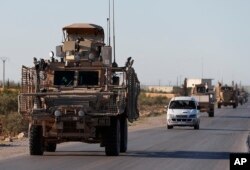U.S. President Donald Trump is not backing away from his assertion the time has come to pull U.S. troops out of Syria, even as Washington’s partners on the ground are urging him to reconsider.
"Our primary mission in terms of that was getting rid of ISIS,” Trump said Tuesday, using an acronym for the Islamic State terror group.
“We've almost completed that task and we'll be making a decision very quickly in coordination with others, as to what we'll do," the U.S. president added during a news conference with the heads of three Baltic nations. "I want to bring our troops back home."
While the president seemed to leave open the option that U.S. forces could stay in Syria a bit longer, the prospect of pulling all forces from the counter-IS fight is not sitting well with U.S. allies, including the Kurds and Iraq.
“A sudden withdrawal from Syria would send a frightening message,” Bayan Sami Abdul Rahman, the Kurdistan Regional Government Representative to the United States, said earlier Tuesday during a discussion at the U.S. Institute for Peace.
“These all ring alarm bells for us and I’m sure for the people of Syria,” Rahman told reporters later of the rash of news stories indicating U.S. forces could soon be pulled from Syria, adding Kurdish officials have already voiced concern to their U.S. counterparts.
Iraqi Ambassador to the U.S. Fareed Yasseen, speaking at the same event, expressed similar reservations.
“We still suffer from Syria,” Yasseen said. “Still to this day, we have insurgents crossing the border.”
Rather than see the United States leave Syria, Yasseen said Baghdad would like the U.S. to engage more broadly across the region, and even encourage private companies to look to invest more in Iraq.
Despite President Trump’s pronouncements on Syria, other key U.S. officials have been more cautious.
"We are in Syria to fight ISIS,” said Brett McGurk, the Special Presidential Envoy for the Global Coalition to Defeat IS, speaking Tuesday at the U.S. Institute for Peace at nearly the same time as the president.
“That is our mission and our mission isn't over,” he said, adding that the U.S. presence in Syria remains “incredibly effective and strong.”
“We are going to complete that mission," McGurk said.
The top military commander for U.S. forces in the Middle East also indicated U.S. and coalition troops could remain in Syria for some time to come.
"There still are some areas where they [IS] are present and that we will have to continue to operate on,” said U.S. Central Command Commander Gen. Joseph Votel.
“Our goal is to continue to keep pressure on ISIS...and at the same time to continue to work through the other tensions that are very present here in northern Syria,” added Votel.
Votel also indicated the U.S. could continue to have a military presence in Syria, and Iraq, even after IS is thoroughly defeated.
“The hard part I think is in front of us," the CENTCOM commander said. "There is a military role in this, certainly in the stabilization phase."
Trump on Tuesday said the United States has spent "seven trillion dollars in the Middle East over the last 17 years" and that Washington receives "nothing out of it."
"Saudi Arabia is very interested in our decision and I said 'well, you want us to stay maybe you’re going to have to pay," the U.S. president noted.
The White House said Trump discussed "joint efforts to endure the enduring defeat of ISIS" in Syria during a Monday phone call with Saudi King Salman bin Abdulaziz Al Saud.
Still many in the region are waiting to see whether Trump's statements are put into action on the ground in Syria.
"I think we've also learned, certainly with this administration that quite often what comes out in the media is not necessarily what's going on" Kurdistan Regional Government Representative Rahman said Tuesday. "We don't hit the panic button immediately even though it is a cause for concern."





